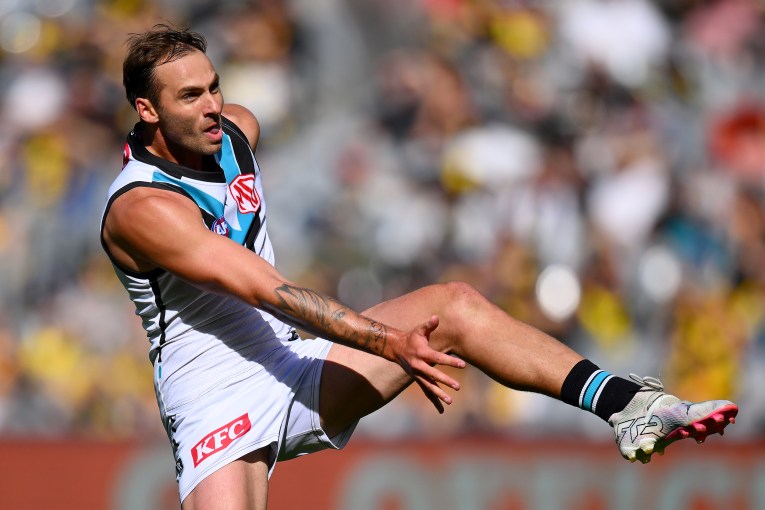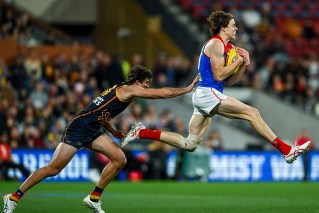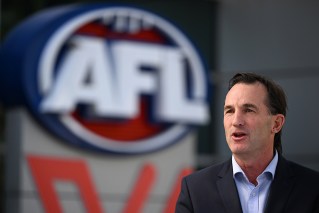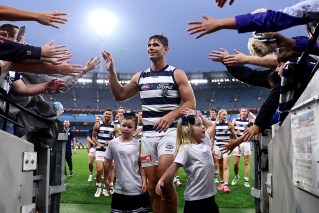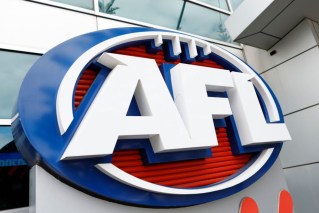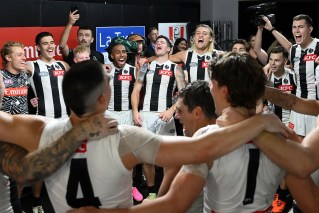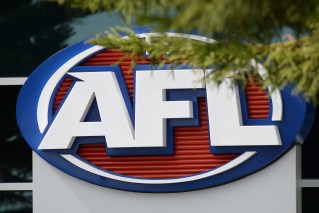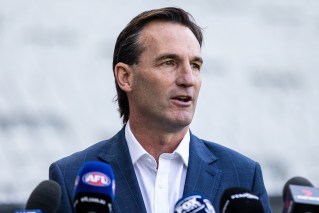Reaction to Lumumba’s stand a free kick for homophobia
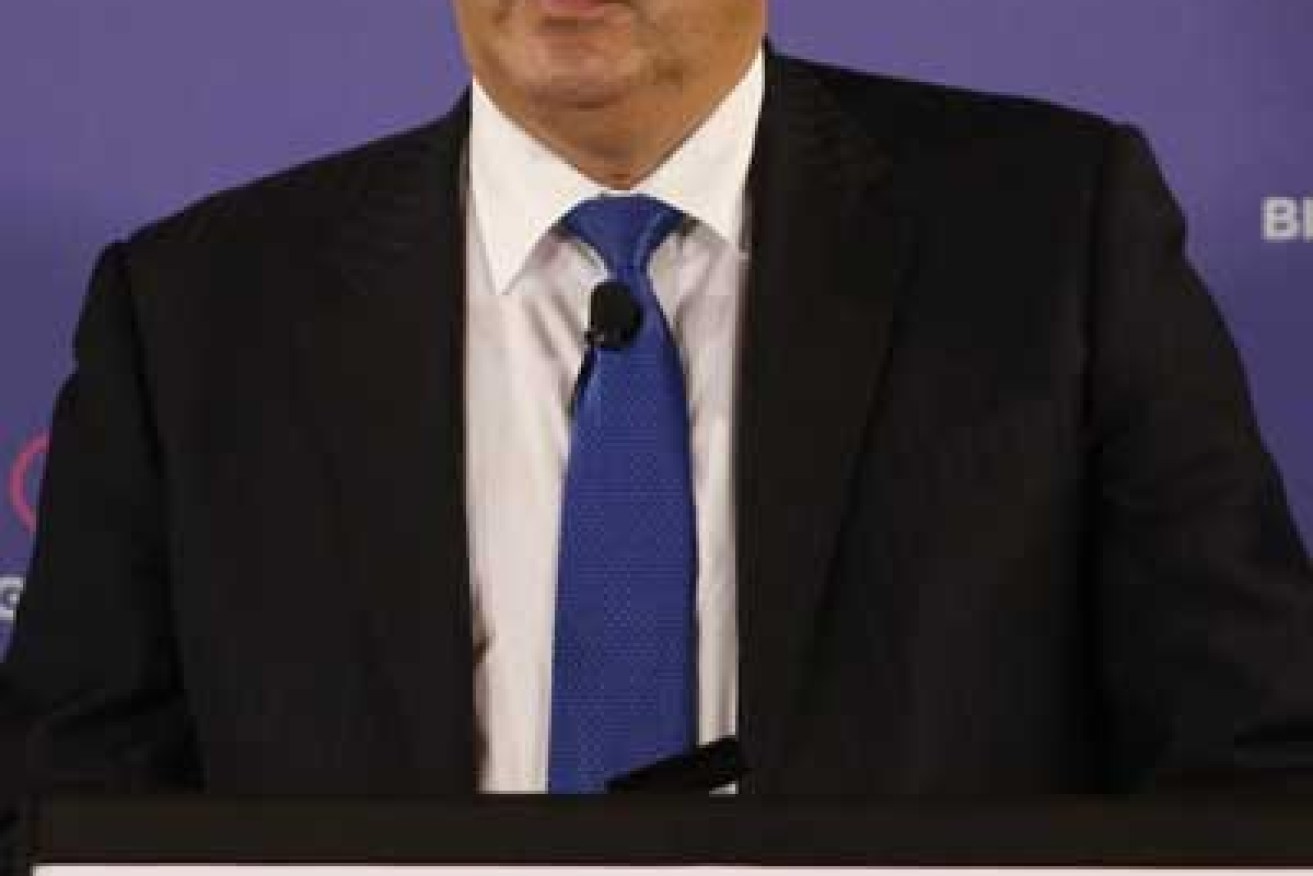
The AFL is committed to removing homophobia from the game. Photo: Getty
Sport is a national pastime in Australia, much like singing along to Khe Sanh at dusk or binge-watching reruns of Neighbours.
Growing up in country Victoria, I was surrounded by football. At home, on the schoolyard, in my local town. Every year the grand final became a month-long event as stores adorned their windows with team colours, and my classmates predicted how the big day would unfold.
The football field is often seen as a symbol for camaraderie, where communities can bond over their love of the game. But as a young, queer man, it is one that I have often felt excluded from.

Lumumba and Nathan Buckley in happier times. Photo: Getty
When Collingwood player Heritier Lumumba recently spoke out against a derogatory comment written across an image on one of the club’s noticeboards, he was met with raised eyebrows. Someone had written ‘off to the Mardi Gras boys?’ on a poster of his fellow teammates, Scott Pendlebury and Dayne Beams, moving Lumumba to criticise the club for tolerating the homophobic slur.
• Taylor’s gay sledge rocks the AFL
• No openly gay footballers? I know why
While the comment may have been written as a good-natured gag, let’s make what it implies clear: that football players attending a gay pride festival are to be laughed at.
Earlier this year former Chief Executive Andrew Demetriou reinstated the AFL’s commitment to ending discrimination based on sexual orientation. But if subtle everyday discrimination is still able to fly under the radar, like using Mardi Gras as a means to mock footy players, I’m not sure how much weight that commitment actually holds.
The AFL has come a long way in ending sexuality-based discrimination on and off the field, but a more subtle, homophobic culture still exists, which alienates gay men and women from the sport as players and spectators.
When I watch a game, I see an arena dominated by a heterosexual, hyper-masculine culture, leaving athletes who don’t fit the bill to the side. Unless of course my invitation was lost in the mail.
After Lumumba’s dissent, there was speculation he may leave the club, and former Collingwood player Mick McGuane went as far as to say that he had gone “politically mad”. The concern he raised over the slur was palmed off as trivial, and seen by many as unnecessarily rocking the boat. His protest was silenced, and this is the problem.
When a voice speaking out against discrimination is muted, it allows the discrimination to continue. In Collingwood’s case, by dismissing Lumumba and the homophobic joke, the club is telling society that it’s okay to keep this language alive both in and out of sporting culture.
It becomes a small piece of a much larger picture.
To be fair, the AFL has taken strides toward removing the divide between football and the gay community. Last month, new CEO Gillon McLachlan publicly declared the league’s support for marriage equality, saying that “the AFL will keep saying no matter how many times it takes, that our game does not tolerate discrimination in any form”. But in order to completely shift attitudes toward queer sexualities in sport, an engagement at every level is required, big and small.
Of course, large-scale human rights issues are important, but subtle everyday homophobia is equally as important if we want to see Australian football free from any form of stigma or exclusion.

The AFL is committed to removing homophobia from the game. Photo: Getty
A gay high school student reading or hearing a comment similar to the one written on Collingwood’s noticeboard would think two things. One, that his or her sexuality is something to be made fun of, and two, that sport holds no place for the gay community.
It is damaging for any young athlete exploring his or her identity to be in an environment where light-hearted jokes and banter that use homosexuality as their punchline are an unquestioned norm.
I want to see a football culture that accepts sexual diversity both on the field and in the locker room, so that members of the LGBTI community feel comfortable participating in the game and are not made to feel like outsiders. I want voices like Heritier’s to be heard, and not swept under the rug, because they’re essential in creating change.
And I want the players and spectators who make ‘good-natured’ and off-the-cuff, homophobic remarks to consider their implications in the broader LGBTI community.
Football is a great way to bring communities together, but this potential is not being fully realised while certain groups in society are still being stigmatised. A collective effort is required in the sporting world to ensure that any form of prejudice, however great or small, is made unacceptable.
What I really want is to be able to bring my partner to a game and feel like an appreciated part of our wonderful, national sporting culture.
Matthew Wade is a freelance writer with an interest in sexuality, gender, and film. He is also on the selection panel for the Melbourne Queer Film Festival. Follow him: @MatthewRWade
